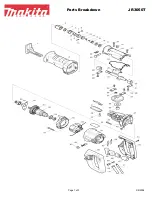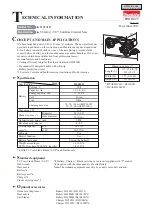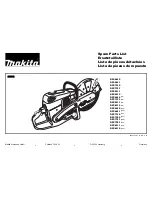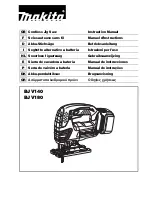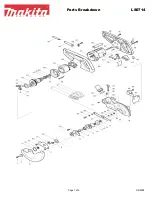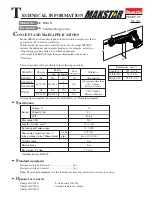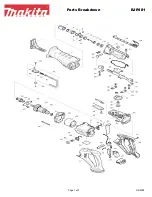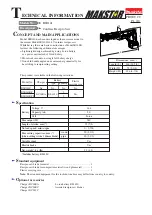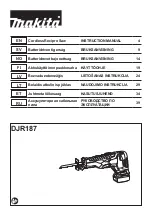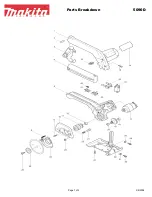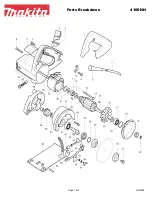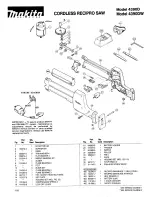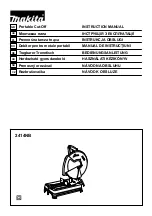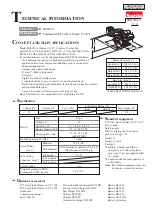
3
English
•
Keep bystanders, children, and visitors away while operating a power tool.
Distractions can cause you to lose control.
ELECTRICAL SAFETY
•
Power tool plugs must match the outlet
.
Never modify the plug in any way. Do not use any
adaptor plugs in any earthed (grounded) power tools. Double insulated tools are equipped with a polarized
plug (one blade is wider than the other). This plug will fit in a polarized outlet only one way. If the plug does not
fit fully in the outlet, reverse the plug. If it still does not fit, contact a qualified electrician to install a polarized
outlet. Do not change the plug in any way. Double insulation eliminates the need for the three wire grounded
power cord and grounded power supply system.
•
Do not expose power tools to rain or wet conditions
.
Water entering a power tool will
increase the risk of electric shock.
•
Avoid body contact with earthed or grounded surfaces such as pipes,
radiators, ranges and refrigerators
.
There is an increased risk of electric shock if your body is
grounded.
•
Do not abuse the cord
.
Never use the cord for carrying, pulling or unplugging the power tool. Keep
cord away from heat, oil, sharp edges or moving parts. Damaged cords increase the risk of electric shock.
•
When operating a power tool outside, use an extension cord suitable for
outdoor use
.
These cords are rated for outdoor use and reduce the risk of electric shock.
•
Do not use AC only rated tools with a DC power supply
.
While the tool may appear to
work. The electrical components of the AC rated tool are likely to fail and create a hazard to the operator.
PERSONAL SAFETY
•
Stay alert
,
watch what you are doing and use common sense when operating a power tool. Do not
use tool while tired or under the influence of drugs, alcohol, or medication. A moment of inattention while
operating power tools may result in serious personal injury.
•
Use safety equipment
.
Always wear eye protection. Safety equipment such as dust mask, non-skid
safety shoes, hard hat, or hearing protection for appropriate conditions will reduce personal injuries.
•
Dress properly
.
Do not wear loose clothing or jewelry. Keep your hair, clothing and gloves away from
moving parts. Loose clothes, jewelry or long hair can be caught in moving parts. Air vents may cover moving
parts and should be avoided.
•
Avoid accidental starting
.
ensure the switch is in the off position before plugging in. Carrying power
tool with your finger on the switch or plugging in power tools that have the switch on invites accidents.
•
remove any adjusting keys or wrenches before turning the power tool on
.
A wrench or key that is left attached to a rotating part of the tool may result in personal injury.
•
Do not overreach
.
Maintain proper footing and balance at all times. Loss of balance can cause an
injury in an unexpected situation
.
•
If devices are provided for connection of dust extraction and collection
facilities, ensure these are connected and properly used
.
use of these devices can
reduce dust related hazards.
•
Do not use a ladder or unstable support
.
Stable footing on a solid surface enables better
control
of the tool in unexpected situations.
•
Keep tool handles dry, clean and free from oil and grease.
Slippery handles cannot
safely control the tool.
TOOL USE AND CARE
•
Secure the workpiece
.
use clamp or other practical way to hold the workpiece to a stable platform.
Holding the workpiece by hand or against your body is unstable and may lead to loss of control.
•
Do not force the power tool.
The tool will perform the job better and safer at the feed rate for
which it is designed. forcing the tool could possibly damage the tool and may result in personal injury.
•
Use the correct power tool for the job
.
Don’t force the tool or attachment to do a job for
which it is not designed.
Summary of Contents for GCS130
Page 39: ...Notes...



















